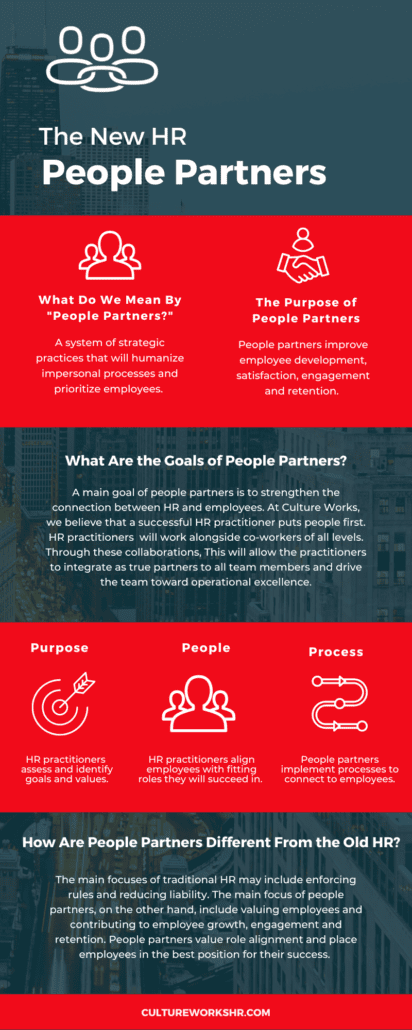People Partners Are the New HR
What do you think of when you think of HR?
The friendly co-worker always sipping lemon tea and bringing donuts? Thursday morning workshops squeezed into the schedule? The adorably decorated office visit to talk about benefits? Some might even think of impersonal conversations about rules and regulations. (It’s okay, you can say it.) We’ll let you in on a little secret: we don’t like those impersonal conversations either. That’s why we’re leaving them in the old HR.
We’ll tell you what we think of when we think of HR: people.
And as much as we love lemon tea, workshops, and decorated offices, we want employees to primarily associate HR with one thing: resources.
How will we accomplish this? We’re so glad you asked. Let’s dive into the new HR.
What Do We Mean By People Partners?
People partners function as a system of strategic practices that will humanize impersonal processes and prioritize employees. By focusing on employee happiness and satisfaction, people partners improve employee development, engagement, and retention.
Sounds like a win-win, right? Let’s look into the goals of people partners in greater detail.

What Are the Goals of People Partners?
Connecting With Employees
The main goal of people partners is to strengthen the connection between HR and employees. At Culture Works, we believe that successful HR practitioners put their people first.
Making HR a Resource Instead of Policing Employees
Some may associate HR with awkward conversations enforcing rules and policies. People partners shift these impersonal conversations into humanized processes. The new HR will use these processes not to enable people, but rather to empower them.
Operating With a Mindset of Growth
People partners place importance on the growth and development of employees.
Coordinating with Employees of All Levels
HR practitioners utilizing the principles of people partners work alongside co-workers of all levels. Through these collaborations, HR practitioners have the opportunity to learn the business partners from each level of the organization.
Impact Change through Purpose, People, and Process
We like to think of it like this:
Purpose: HR practitioners assess and identify goals as well as value alignment.
People: People partners will help integrate, support, and guide performance accountability amongst the team. Further, HR practitioners familiarize themselves with roles and success indicators and align employees accordingly.
Process: HR practitioners implement humanized processes to connect to employees and create change.
Learn more about purpose, people, and process, here.
How Are People Partners Different From the Old HR?
The old and new HR will have many differences, ranging from details in processes to broad responses to problems. Let’s go over a few examples.
- The main focuses of traditional HR may include enforcing rules and reducing liability. The main focus of people partners, on the other hand, includes valuing employees and contributing to employee growth, engagement, and retention.
- Old HR often responds to issues as or after they arise. People partners make an effort to proactively prevent issues through people, purpose, and processes.
- Old HR fills vacant positions at organizations. People partners place more emphasis on retaining employees.
- Traditional HR may speak with employees about poor performance. People partners value role alignment and place employees in the best position for success.
This is the New HR. Ready to Get Started?
Consider Culture Works. Our goal is to work with you for as long as you and your stakeholders need us! We do this by operationalizing your culture, fostering the development of your leadership teams, and driving HR initiatives.
We build Quarterly Game Plans that are focused on Culture, Talent, and HR initiatives and real results.
Learn more about our services, here.











